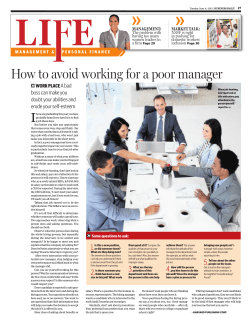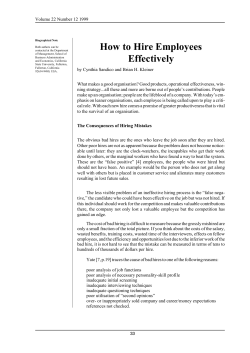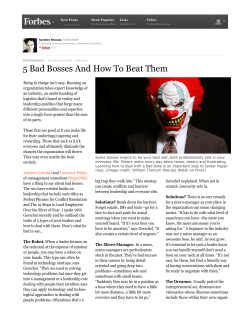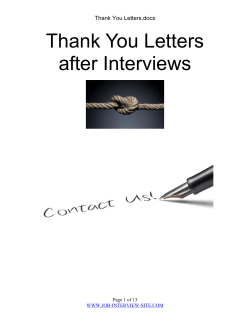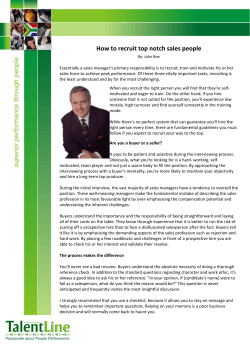
Ace Those Difficult Questions Interview
Career Catalyst Ace Those Difficult Interview Questions Kate Wendleton The Five O’Clock Club This strategic approach to interviewing will help you handle difficult questions with ease — and success. M ANY CAREER BOOKS LIST DOZENS OF interview questions and “good” answers to them. However, you will be more successful if you take a strategic approach rather than recite memorized answers you got from a book. This article provides advice on developing such a strategy that fits you and your job-search situation. Have the right attitude When an interviewer asks a question, don’t ask yourself, “I wonder what the answer to that question is?” Instead, ask yourself, “I wonder how I should play it.” Because business is a game. Job hunting is a game. Interviewing is a game. It’s okay to be a little lighthearted, have a lot of meetings, and get good at playing the game. But when an answer isn’t working for you, change it. Don’t give the same bad answer on dozens of interviews, hoping you will find someone who values you. Find another way to answer the question. Have positive answers to everything. If you are asked about your former boss or place of employment, the game is to see how positive you can make your answers. What would an interviewer think if you said, “My boss didn’t have a lot of time for us”? He or she would wonder what’s wrong with you that you needed a lot of your boss’s time. You’ll leave a negative impression if you say negative things. Keep your answers brief. Pay attention to keep from rambling when you’re trying to explain something. You might have a tendency to explain exactly where you were in the hierarchy, or exactly why you left your last job. But the interviewer doesn’t care about all the details. Practice with a partner at giving succinct answers. Don’t feel compelled to tell the truth, the whole truth, and nothing but the truth. Business savvy is often more important than obsessive truthfulness. When asked why he lost his last job, David answered,“I lost my job because I did my boss in. I really killed him. I even ruined his marriage. Later on, when he had the chance, he did me in.” You’ve got to have a better answer than that. Don’t take every question literally. A job interview is not like a discussion with a friend. For example, if the interviewer asks why you didn’t finish college, should you tell the truth? Should you say, for example: • “I couldn’t decide on a major.” • “My mother died and I had to help out.” • “I ran out of money.” Those answers are not wise, because they’re negative and they take you away from what should be the main CEP December 2004 www.cepmagazine.org 43 Career Catalyst discussion — the company’s needs and how you can help. Keep the interview positive, and try not to discuss subjects that detract from your case. A businesslike answer moves the interview along. For example: “I like to be out there doing things. I finished several semesters, but I wanted to get more done. And that’s what my bosses have always said about me: I’m someone who gets things done. They’ve all been happy with me.” Do not go into long discussions. Briefly and politely handle questions that might take you off-course, then smoothly move the conversation back to the company’s needs or your abilities — the things on your 3 × 5 index card that you had planned to cover (discussed below). Give your answer, and then say, for example, “but I really wanted to tell you about a special project I worked on.” It is your responsibility to get the conversation back on track. Be prepared Your 3 × 5 card will become your little bible. At the top of the card, write a summary about yourself. That’s your “two-minute pitch.” Also list three to five accomplishments that you want to talk about, and the answer to what you consider a tough question. Master these. Carry the card in your pocket or purse, and review it before you go into the interview. This is what you want to tell people — regardless of what they ask you. Think like a politician: It doesn’t matter what reporters ask — the politician knows what he or she wants to talk about. Difficult interview questions are any questions that take you off course — that get you away from what you should be talking about during the interview. So, if the interviewer asks about your tennis game, get the conversation back on course: “Well, I don’t know about tennis, but it reminds me of my last job. One of the things I did there was …” Then talk about an accomplishment you have listed on your 3 × 5 card. Tennis is just one example of the type of question that can lead you off-course. Normally, such a question will be about something job-related that you don’t want to discuss — such as what happened in your last job, or the one assignment in which you did not perform at your best. To avoid letting that one assignment Sample Questions H ere are some sample questions and possible replies to start you thinking. Remember, though, that you must develop your own answers that fit your situation and your style. Tell me about yourself. Use your two-minute pitch to answer this question. Why are you looking? Why are you leaving? Have an answer to this question ready, keep it brief, and then move back to the topics on your 3 × 5 card. Some job hunters have very solid reasons for being out of a job. One executive in his mid-fifties lost the best job of his life when his boss died and the new president brought in her own person. He was out through no fault of his own, and there was no better answer than what really happened to him. Other than a story like that, the best strategy is to describe your job loss as something you were proactive about — as if you had some say in the matter, and are also glad about it. At the very least, do not describe your job loss as having to do with your own performance. Some positive responses: “My company is going through a reorganization. I had the option of taking another job internally, but I decided to look elsewhere.” 44 www.cepmagazine.org December 2004 CEP “ABC Company has been great for me, but the career possibilities there in the areas that interest me are extremely limited.” “Perhaps you heard that the chemical industry has been going through a major restructuring. I was caught, along with 3,000 others.” If you’re still employed, or if you’re in outplacement and are allowed to look for a job in your old firm: “I don’t know that I am leaving. I’m talking to people around the company. They would like me to take another job there, but I feel like I want to look outside as well.” If you lost your job and received severance, you can say: “I had the opportunity to take a package and I grabbed it. I’m so lucky. I was not growing as much as I would have liked and now I can move my career along. That’s why I’m glad to be talking to you today. I understand that your department is very involved in the new technologies.” You’ll rarely be asked how long you will be getting paid, and it’s nobody’s business anyway. If you had been working long hours: “I decided I couldn’t work 75 hours a week and also look for a job. I ruin your interviews, handle the question briefly. Give enough of an answer, and then move on. “Another job I had that’s even more interesting was …” Get back to your card. If you’ve been unemployed for a long while, be prepared. You may be asked what you have been doing for the past two years. Employers don’t want to hear that you’ve been a stay-at-home dad, regardless of how proud of that you are. That has nothing to do with business. Instead, say that while you’ve been taking care of a family situation, you’ve also been studying cost estimating, you have been going to meetings of the cost estimators society, you’ve become an expert in cost estimating, and you’ve done some cost estimating as a volunteer for a friend’s consulting business. If you haven’t been doing anything, do something! Before you start answering questions, know something about the employer’s needs. For example, Angie’s been a process unit supervisor and is great at managing an operations staff. But this employer wants a troubleshooter who can solve some of its long-term reliability problems. Angie can’t stick with her regular pitch, which is, “I’m great at supervising operators and keep- couldn’t do justice to my staff or to my former employer. I left the company so I could conduct a proper search.” If you didn’t get along with your boss, it’s not a good idea to say that you left because of personality conflict. People may suspect that you are a difficult person. Sometimes those at very senior levels can get away with the “personality clash” excuse, but even then it’s better to say, “We had differences on strategic issues.” When you’re tempted to talk about conflict with a boss, it’s best to say instead: “I want to move my career in a different direction. My expertise is not the most important thing at my present company, and I want to move to a company where my skills will be put to better use.” What are you looking for? Nothing turns off interviewers more than candidates who don’t know what they want. So don’t speak in generalities like, “I’m looking for a job that excites me” or, even worse, “I’m not sure.” This amounts to asking the interviewer to come up with ideas for you. You shouldn’t be going on job interviews if you’re not hungry and focused. Be prepared to name the kinds of positions you think would be appropriate for you. If your two-minute pitch is polished, you will be able to talk persuasively about the kinds of things you can do for the company. ing production going.” The employer needs someone who can analyze the manufacturing process and also manage a staff. So, probe first. If you don’t know where the interview is headed, you can say, “There are a lot of different ways I can answer this. Can you tell me a little about your situation? What are your goals? What are you trying to do? What are the problems that keep you up at night?” Find out something so you’ll know how to position yourself. Remember that you’re talking to a specific company, so do your research in advance. Then you can say what interests you about the organization. Businesses want to hire people who want to work for them. Level the playing field Job hunters feel vulnerable — employers seem to hold all the power. To level the playing field, have six to ten prospects in the works. That way, you won’t feel intimidated by one company. In addition, even those who have been unemployed a long time can still land jobs at market rates. The issue is no longer, “What have you been doing for the last eighteen months and How long have you been unemployed? If you’ve been unemployed for a long time and have had problems such as depression over being out of work, family troubles, or an extended illness, you should develop a good answer you can live with. Think of what you have been doing. Have you been working on your computer? Helping at your place of worship? Doing volunteer work? Helping a friend with a business? Most people can think of something they’ve been doing — even something little — that they can build a story around. If you really haven’t been doing anything at all, then go do something! You are unlikely to interview well if you haven’t been out there at all. Get your adrenaline going. Walk dogs, pick strawberries, usher at church. Get active. Better yet — learn a new skill. Master new software. Take refresher courses. Volunteer your skills, or get paid something nominally. Then you can give an answer like: “I’ve actually been looking only a month or so. After I left RST Company, I spent some time working on a special project for a small company.” “I’ve been looking only a few weeks now. After working for more than 20 years, this was my first time off, and I took advantage of the time to [fix up my house, take care of a sick family member, learn a process simulation program, etc.]. I was glad to have the opportunity to CEP December 2004 www.cepmagazine.org 45 Career Catalyst how much were you making in your last job?” If you’re talking to five other potential employers about jobs in the $75,000–$100,000 range, you’re in a strong negotiating position. You can also level the playing field by thinking of yourself as a consultant, rather than as a desperate job hunter who hopes somebody will have pity on you and hire you. A consultant asks questions, has pen and paper ready, and probes about the employer’s situation. A consultant also asks about the competition. An important question to ask yourself is this: If an employer were to offer you a job and ask you to start work in a week, what’s the gap between what you know now and what you need to know to be effective in the new job? For example, you might need to talk to the head of quality control, or the operations supervisors, as well as some of your prospective peers. Or you might need to do some research to learn more about the industry, then go back for another meeting. If you think about actually getting the job, you may realize how little you know. Ask those types of questions during the interview. Your whole thought process will change, and your demeanor in the interview will change along with it. [help out, learn something new, etc.]. But now I’m ready to get back to work and put in another 20 years.” “I’ve been working part-time for a small firm. I thought it would be fun to try after so many years with a big company, but now I know I like corporate life and I want to get back.” What would you like to be doing five years from now? “Actually, I’d like to do the best job I can possibly do in the position we’re talking about now. I know that if I do a great job, good things will happen to me later. They always have.” How would you handle [such-and-such]? The interviewer describes a problem situation and asks how you would handle it, but you can’t think that quickly. Some possible replies: “I’d have to give it some thought. I’m the type who likes to think things through. I’ve been up against problems like this before, such as when we were behind schedule at LMN Company. I studied the problem, and quickly decided we should do … This reduced our processing time and everyone was happy.” “Everywhere I’ve worked, I’ve been able to assess situations and resolve them, and I’d do the same for you. I’m not sure how to best answer your question at the moment, but I know I would be able to handle that type of problem. I have a good track record.” 46 www.cepmagazine.org December 2004 CEP Don’t tolerate extremely rude interviewers. Some take advantage of what they think is their power position. Some interviewers don’t know how to interview. They can be unfocused, or fail to observe simple interviewing etiquette. If a hiring manager allows interruptions by making telephone calls or answering them, consider saying, “I don’t mind waiting outside for a few minutes while you take care of these emergencies. Then we can have a more quiet meeting.” Unless that behavior is typical of the industry you’re in, consider not putting up with it. Stop standing in your own way When you have six to ten things in the works, they’re not all going to be brilliant possibilities. Many will be with organizations you don’t ever want to work for. But getting the offers serves several purposes — it boosts your ego, helps you to better compare one situation with another, and increases your chances of getting offers from the companies that are of most interest to you. You will be able to say, “I’ve got four offers right now, but I don’t want to work for the others. I want to work for you.” Prospective employers will see What are your greatest weaknesses? First take time to mull it over. Then say something like: “Actually, I can’t think of any work-related weakness. My bosses have always thought I was great. I’m the kind to not only do my own job, but also notice what else needed to be done in other areas and pitch in to help.” Or, name a weakness and show how you have dealt with it, such as: “Sometimes I get impatient with people because I want the job to get done. But I make sure I find out what’s going on and help them with whatever may be stopping them.” What are your strengths? Don’t simply say, “I’m organized, dependable and honest.” They won’t remember your strengths unless you also give an example to illustrate each one. For example: “I’m very organized. I was asked to update five years’ worth of maintenance records. Within just three months, I was able to identify several areas of weakness and provide the data we used to develop a new predictive maintenance program.” Tell me about the worst boss you’ve ever had. No matter what your bosses have been like: “I’ve been really lucky. I’ve been blessed with good bosses. They’ve all been different, and I’ve learned from each of them.” you as more marketable. So get some offers — even ones that are not right for you. One job hunter was having a hard time in his search, and he thought companies didn’t want to hire him because he was single. He had been living with a woman for nine years and would not marry her. Because it bothered him, he would inadvertently bring up the fact that he was single during the interview process. If you tell interviewers, even in subtle ways, that there is something wrong with you, they are unlikely to take a chance on you. Even if they don’t think there’s anything wrong, they’ll figure that if you do, there must be. And they’ll stay away from you. Here’s an example that doesn’t sound as silly. Richard was in charge of a piping design team and supervised about 20 junior engineers and CASE STUDY: Feeling at a Disadvantage N ot all of the rudeness is aimed at lower-level people. George met with five senior company executives. They liked him and asked him to meet with a psychiatrist. The psychiatrist reported back to management erroneous impressions about George, such as that he was too detailed a person. In fact, George was an amazing strategist. One of the senior managers said to George, “The psychiatric report was not so good …” and they told him about it. George had a lot to offer, but that conversation made him feel deflated. When he regained his composure, he wrote them a note to regain the offensive and bolster his self-esteem. He wrote, “I’m interviewing with six or seven other companies right now. I’m impressed by your company as well, but I wanted to give you some feedback. I don’t think the method you are using for hiring is very sound. The psychiatrist’s analysis did not accurately reflect my working style. I think you should be a little cautious about this in the future when you’re hiring senior executives.” When you feel you are being mistreated, you can respond. You can take the offensive — but not to the point that it takes you off-strategy. Above all, move on. And when you have six to ten things in the works, it’s easier to move on. George did not end up working there, nor did he want to. He had plenty of other offers. What is your current salary? The best strategy is to postpone the discussion of salary until you get an offer. And remember, the person who names a number first is in a weak position. How many other companies are you talking to? “I’ve been very pleased with the response to my resumé. I’m looking at several opportunities.” Don’t tell them the names of the other companies. If you are not talking with other companies, you can say that you are just getting started and expect to be talking to a good number shortly. It is not a good strategy to pretend that you are on the verge of another offer if you are not. The hiring manager may tell you to take the other offer. Instead, get out there and talk to other companies. We have two positions open. Which would you prefer? Hedge your bets. “I could see myself doing [this] and I could also see myself doing [that].” What is your management style? This is a common question, so don’t be blind-sided by it. Be prepared to give examples. Think of stories that demonstrate your management style. “Four years ago, my staff was cut while workload was increasing …” How good are you at … It’s not good enough to say, “Very good.” Instead, elaborate on how good you are: “I’m excellent at what I do. I have always been selected for the toughest assignments, the ones that no one else could do. For example, …” What questions do you have for us? I go into an interview with an 8-1/2 × 11-in. pad. At the top of the pad, I write the four or five questions that I want to ask, and I integrate those questions into the conversation. I also take notes during the interview because I want to remember details to include in my follow-up letters. If I meet with five people in one day, I cannot possibly remember what each person said. Notes are crucial, though, even if you talk with only one person. At the end of the meeting, when the interviewer asks if I have any questions, I make a point of looking at my questions (even though I know that I’ve already asked them all) and say, “No thanks, we’ve covered them all.” But because the questions were written on the pad, I look prepared. This would be an appropriate time to ask about the hiring process, with questions such as: “Where are you in the decision-making process?” “What other types of candidates are you talking to?” “How do you see me stacking up against them?” CEP December 2004 www.cepmagazine.org 47 Career Catalyst designers — a responsible job. For some reason he was sensitive to the fact that he had been in this position for “only” two years. In his two-minute pitch, he brought up what he considered a weakness. “Well, I’m head of piping design at ENC International, where I have 20 people reporting to me. It’s going very well, despite the fact that I’ve been on the job for only two years.” When Richard positions himself that way, the hiring manager is going to think there’s something wrong with his having been in the job two years. If you feel something is a handicap for you, think twice about mentioning it. Don’t bring it up! If you think your age is a problem, you may inadvertently say, “Despite the fact that I’m older” or “Despite the fact I’m only recently out of school.” Remember, positioning is everything. Be careful what you say. Your attitude should be, “Problem? What problem?” Be sensitive to your own sensitivities — and get over them. So I said, “She’s a smart woman. As an outsider, I couldn’t possibly know what she knows about this. I’m sure she’s making the right decisions for the right reasons.” Don’t let politics stand in the way of your getting a job that you know you can do well. Handle discrimination discriminatingly If the interviewer asks you questions that are illegal (such as questions about pregnancy or your plans to marry), assume they are not being asked maliciously. Instead of answering the question itself, answer the If your answers concern that may have prompted the aren’t working — question. For example, if someone asks if if you’re not getting you have small children at home or second interviews are married, you cannot point out that it’s illegal to ask that. The interor job offers — viewer will apologize, but you won’t change your answers. get the job. Instead, try to figure out why they’re asking you that question and answer their concern. You could say, for example, “Are you concerned that I might not show up at work? I’ve never missed a day in 15 years.” Don’t play politics About 15 years ago, I was being interviewed by a large company for a part-time consulting assignment. The good interviewer My prospective boss told me an idea she had that had It may not happen during your entire job search, but nothing to do with my job. Her plans didn’t make sense be prepared for the person who conducts a good interto me, but I would not risk discussing them with her view. In a good interview, the hiring manager may start until after I was hired. with the beginning of your career by asking, “What did Then I met with her boss, who told me he thought her you do in this job?” “Why did you leave that job and project was idiotic and asked me what I thought. What I go on to the next one?” “What did you like best about thought was, “I’m not going to undermine my prospecthat job?” “What about your boss?” Then he or she tive boss on a job interview!” asks you about each next job in a methodical, organized way. You are not going to get very many interviewers like that. KATE WENDLETON is president and founder of The Five O’Clock Club (www.FiveOClockClub.com), a national career counseling organization that serves professionals, managers and executives by offering services directly to individuals as well as outplacement via the corporate market. She has been a career coach since 1978, when she founded The Five O’Clock Club and developed its methodology to help job hunters and career changers at all levels in job-search-strategy groups. She founded Workforce America, which helps adults in Harlem move into better-paying, higher-level positions, and she founded, and directed for seven years, the Career Center at The New School for Social Research in New York City. A former CFO of two small companies, she has 20 years of business-management experience in both manufacturing and service organizations. She advises major corporations about employee careerdevelopment programs, and coaches senior executives. She is a nationally syndicated columnist and a respected authority and speaker on career development. She attended Chestnut Hill College (Philadelphia) and received an MBA from Drexel Univ. 48 www.cepmagazine.org December 2004 CEP Final thoughts Be prepared. Have six to ten things in the works so that you’re not at a disadvantage. Remember that the purpose of the first interview is not to get a job offer — the purpose of the first interview is to get the second interview. You’re trying to give and get information so that you can get that next meeting. Half of the interview process is being prepared, but the other half is having that right attitude. Interviewers will sense your self-confidence and you are less likely to buckle under when they ask you idiotic questions — CEP often they don’t care about the answers anyway.
© Copyright 2025
